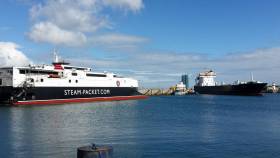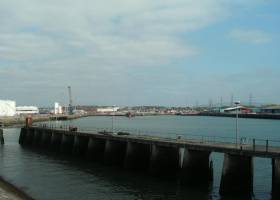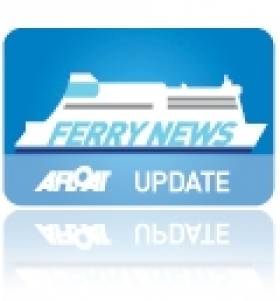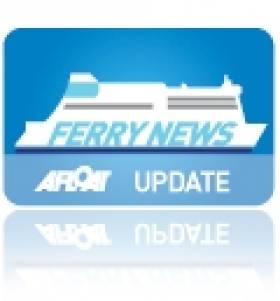Displaying items by tag: SteamPacket
Isle of Man Operator to Take Berthing Trials In Northern Irish Port
#Larne - The Isle of Man Steam Packet is to undertake berthing trials in the Northern Irish port of Larne, writes IOM Today.
The fast craft Manannan is to used as the company assesses the suitability of alternative ports ’to allow for flexible and robust contingency planning’.
Similar to the trials conducted at Holyhead in 2016.
Manannan will return to service on March 31.
After spending the winter in Manx waters, where annual maintenance procedures were undertaken, the vessel is scheduled to sail to Merseyside on March 1 for dry docking and other specialist work before resuming daily services between Douglas and Liverpool.
The Steam Packet has previously operated sailings between Larne and Douglas during the TT festival, using the charter fast craft P&O Express.
A freight-only ferry, Seatruck's ro-ro Arrow on charter to the Steam Packet adds Afloat has been wintering in Larne that has a uniquely rail-connected integrated ferryport terminal. The Arrow has been used to support the operator's ropax ferry Ben-My-Chree during busy periods on island's main route to Heysham.
To read more from the Manx newspaper click here.
Isle of Man Ferry Reschedules Service Due to Dredging Problems in Heysham
#Dredging - The Isle of Man Steam Packet is running into problems at Heysham, its main port in England.
The ferry company according to IOMToday is blaming a ‘failure of an agreed dredging programme’ for disruption to Douglas-Heysham services from today, Friday to next Monday.
A revised schedule for ropax Ben-my-Chree services has been announced.
This is due to a combination of tidal conditions and a lack of agreed dredging at Heysham means there will be insufficient under keel clearance for the vessel to operate its planned sailings.
For information on the following re-scheduled sailngs click here
Manx-Dublin Night-time Sailings Reopen for Festive Season
#IOMferry – Seasonal sailings between Isle of Man and Dublin Port are timetabled for next weekend (21-22 Dec.) with night-time crossings made in both directions.
Once again, Ben-My-Chree now in her 15th year of service, operates these winter Douglas-Dublin round trip sailings. The ro-pax ferry departs the island capital on Saturday night (19.30) on the 4 hour 45 minute crossing. Return sailing time from Dublin Port is on the Sunday (01.00).
These sailings times will be repeated again on the Steam Packet route during the first weekend after Christmas (27-28 Dec.). To consult sailings schedule visit: www.steam-packet.com/timetables and for latest updates on sailings click this link.
Plans for Wind-Farms Won’t Affect Manx Ferry Operator
#MANX FERRY – The IOM Today reports that the Manx Government is drawing up plans to ensure that any wind-farms built within the waters off the island would not affect ferry routes.
Work on the Isle of Man Marine Plan is under way and the Department of Environment, Food and Agriculture's director of environment Martin Hall said it was important it was completed in a 'timely manner'.
One of the plan's objectives would be to identify current activities in Manx waters and safeguard their ongoing use. Mapping the location of navigation corridors, important natural areas and pipelines/cables will enable the island to identify potential wind farm sites that will not adversely affect current uses of the Manx marine environment, including ferry routes and fishing.
The comments come following criticism from the Isle of Man Steam Packet Company over Centrica's plans for a wind farm in the Irish Sea, outside Manx waters. The Steam Packet says that Centrica plans to develop in the path of two routes: Douglas-Liverpool and Douglas-Heysham, in spite of complaints from the ferry operator. For much more on this story click HERE.
































































